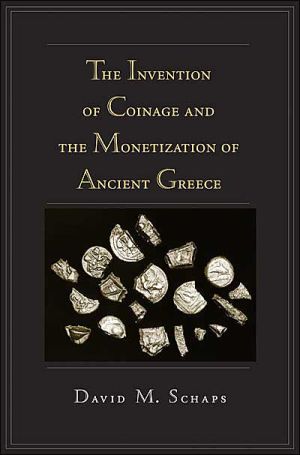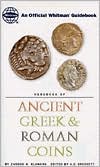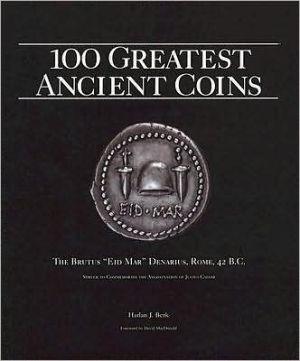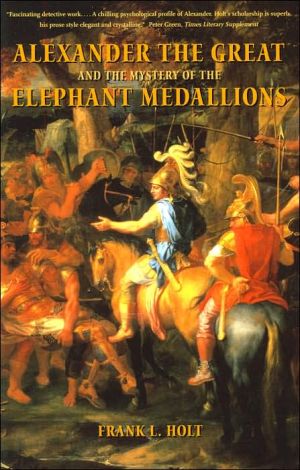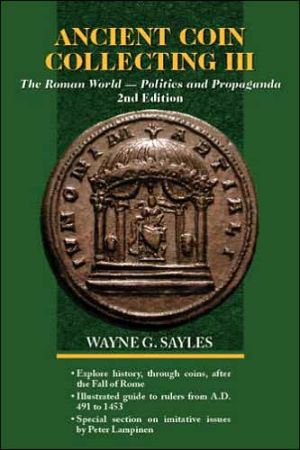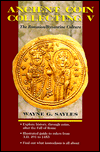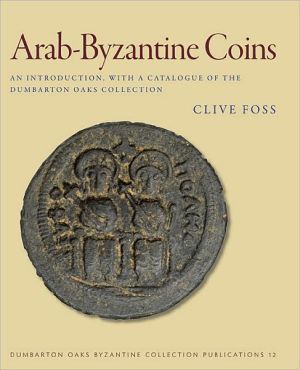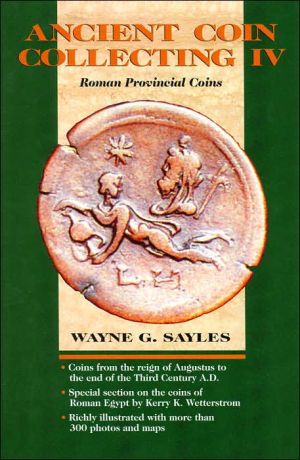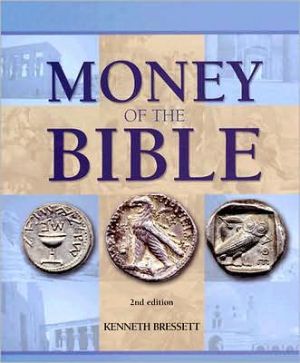The Invention of Coinage and the Monetization of Ancient Greece
Coinage appeared at a moment when it fulfilled an essential need in Greek society and brought with it rationalization and social leveling in some respects, while simultaneously producing new illusions, paradoxes, and new elites. In a book that will encourage scholarly discussion for some time, David M. Schaps addresses a range of important coinage topics, among them money, exchange, and economic organization in the Near East and in Greece before the introduction of coinage; the invention of...
Search in google:
Reveals how the concept of money did not materialize until the invention of Greek coinage
The Invention of Coinage and the Monetization of Ancient Greece\ \ By David M. Schaps \ THE UNIVERSITY OF MICHIGAN PRESS\ Copyright © 2004 University of Michigan\ All right reserved.\ ISBN: 978-0-472-11333-0 \ \ \ Chapter One\ The Revolutionary Invention \ OCCASIONALLY AN INVENTION succeeds so thoroughly that it changes permanently the terms in which its society thinks. It becomes an essential part of the world; life without it is hardly conceivable, and when observing other societies-or indeed, when remembering one's own society before the coming of the invention-one tends to imagine that there must have been something in the society that fulfilled, in a primitive manner, the place of the new invention. Writing was such an invention; not only the nature of communication but also our way of thinking about it has been changed permanently by literacy. Words have lost their wings and can be held for ages; we think we possess knowledge, even if nobody remains on earth who knows it, if only it remains written in a book; the most solemn agreements may not be binding until they have been written down. The clock was another such invention; within a few decades, it had organized society around fixed times of day, known with an accuracy that had once belonged only to the angels. All previous methods of measuring time-the notched taper, the hourglass, the sundial, the water clock (varied instruments serving various purposes)-were seen as primitive clocks; the new invention had superseded them all, and the difference in their functions became a matter for antiquarians.\ Money, particularly coined money, was another invention that irrevocably changed people's way of thought. Here, too, various functions, previously separate, united themselves in a single concept; here, too, the invention has become an essential part of agreements that would once have been binding without it. People may consider themselves happy or miserable in proportion as they possess it, and they may dedicate most of their waking hours-indeed, most of their lives-to its acquisition. Yet money has not always been with us. Adam and Eve were penniless; so, if you prefer them for a pedigree, are the great apes. Money, as ubiquitous as it may seem to us, is not an essential part of the human condition.\ Coined money was invented. It was invented in three times and places-Greece or Asia Minor, India, and China-that we can determine with what passes, at this distance, for reasonable exactness. Like other inventions, it developed out of certain predecessors and succeeded because it fulfilled an important need of the society that came to use it. Again like many other inventions, it developed in many extraordinary ways that could not have been foreseen; it had effects in areas of life that would have seemed to be vastly removed from its proper sphere; and it changed the world so profoundly that not only do subsequent generations find it difficult to imagine what the world can have been like without it, but-for that very reason-they can appreciate only with difficulty the effects that it continues to have on them.\ The intention of the present study is to trace the invention of coinage and its introduction to ancient Greece, to demonstrate how it differed from its predecessors, and to show how its influence proceeded through the society that adopted it until most areas of that society had been fundamentally altered. This book is a historical one, written in the past tense, discussing things that happened to people long dead. The nature of the subject is such that its study should prove enlightening on many aspects of our contemporary lives, but I have not written it for any polemical purpose. Although I could hardly avoid occasional remarks of contemporary relevance (if only to keep the readers and myself from anachronism), readers are likely to find their own conclusions more interesting than any to which I could try to lead them.\ WHAT IS MONEY?\ The definition of money has exercised economists for generations, without producing a universally accepted definition. This need not and has not prevented intelligent discussion. Like hard-core pornography, money may be difficult to define, but we know it when we see it.\ The question of a proper definition is important and essential for an economist; for a historian dealing with the genesis of an idea, it is not only nonessential but misleading. The purpose of a definition is, as its etymology indicates, to set up boundaries between one concept and another; a proper definition selects one characteristic-not necessarily the most obvious one-and limits the thing being defined to all items having that characteristic. It takes some mathematical sophistication to recognize that a circle-and only a circle-is the locus of all points at a given distance from another point, but this definition makes it possible for mathematicians to speak about a circle in a consistent and productive manner.\ For the historian tracing the beginning of an idea, a definition is a hindrance. One person's circle is another person's loop; metaphorical uses ("This is popular in leftist circles"), contextual references ("The Arctic Circle"), and other linguistic phenomena extend a word's meaning yet further. Most problematic is our willingness to apply the term circle to any number of more or less round figures, not one of which fits the mathematical definition. Anyone who would discuss the genesis of the concept of a circle (if there ever was such a development) must bring into account many items that people may consider to be more or less circular. A scientist defines a concept in a way that makes it useful for science; that concept, once defined, ceases to mean to the scientist the same thing that it means to the rest of us. Geometry makes great use of circles as it has defined them, even though it is in fact impossible for anything tangible to fit the mathematical definition of a circle, for a circle as defined mathematically has no thickness and no width.\ I shall not, then, define money precisely here, though to avoid speaking in an utter vacuum, I offer Glyn Davies's "preliminary definition" that "money is anything that is widely used for making payments and accounting for debts and credits." In the contexts I will be considering in this book, money is normally a physical object whose value is widely recognized. One can estimate anything's value in money, and one can buy anything with money. A person who has money is wealthy; a person who does not is poor.\ Like any concept, this one becomes fuzzy around the edges. Recent generations have become comfortable with the idea that money need not be a physical object; the government of the United States, for example, may be considered to own more dollars than have ever been minted or even printed. Debts owed to a person may be money, and may even be used to pay others; that is what we do when we write a check. Many items that are used by primitive people may seem to us to be in some sense money, although we cannot ask the people involved what their opinion is without first explaining to them what we mean by money. We are willing to say that time is money or that five cents is not money nowadays. A definition must draw a line that excludes many of these uses and includes others; a historian asks different questions: How did this concept of money arise? Why has it been so powerful and so enduring?\ Before approaching these questions, I must deal with another objection: that all concepts are fluid, so that it is tautological to state that earlier peoples did not have our concept of money. To an extent, this is true; not only the ancient Greeks but Europeans and Americans of a very short time ago did not agree to the idea that a note not backed by silver or gold was really money, and I confess myself to having been surprised when I first came to a country where workers are paid with a check stub but no check. These developments do indeed point to a modern concept of money that is not the same as the Greeks', and undoubtedly every society has its own way of understanding money. But the underlying concept of money has been extraordinarily stable, so that a modern immediately recognizes a Greek coin as money, although we have more difficulty recognizing a cowrie shell or a three-ton stone as such. Something new happened with the invention of coinage, and it produced a new idea that persists to our day. The questions of its origin and its power are not idle.\ THE STATE OF THE PROBLEM\ Aristotle did not find it difficult to offer an explanation for the invention of money. He cannot have had any reliable historical information on the subject, but in history, as in science, his uncommon gift of common sense offered a plausible explanation.\ For when, by importing things that they needed and exporting things of which they had too much, people became dependent upon more distant places, the use of money was invented out of necessity. For not all of the things that are required by nature are easy to transport; and so, for use in exchanges, they agreed among themselves to give and take something of a sort that, being itself one of the useful items, was easy to handle for the needs of life, such as iron or silver or anything else like that. At first it was simply defined by size and weight, but finally they also added an impressed stamp, to free them from measuring it, since the stamp was put on as a sign of the amount.\ Aristotle's description is of a piece with the best of Greek science-plausible, explaining the unexplained, fitting the well-known facts, and wrong.\ The Roman jurist Paulus offered a similar description.\ Buying and selling took their origin in exchange. For once there was no such thing as coin, nor was one thing called a commodity and the other a price, but everybody would exchange what he did not need for what he did, according to the needs of the time and the situation, since it often happens that one person has too little of that of which another has too much. But since it neither always nor easily happened that when you had what I needed, I, in turn, had something that you were willing to accept, a material was chosen to have a fixed value, guaranteed by the state, which could help the difficulties of exchange by equalizing its quantity. That material, struck by the state, shows its use and title not so much by its substance as by its quantity, and no longer are both items called commodities, but rather one of them is called the price.\ Paulus is not merely echoing Aristotle. For one thing, Paulus is a jurist: as we shall see in this chapter, the explanations offered by different scholars for the invention of money often reflect differences in the scholars' field of expertise. Paulus is explaining not the origin of money but the origin of the concept of sale, which he identifies as having come about with the invention of coinage. He presumes the invention to have been spurred by local trade, whereas Aristotle thought it came about "by importing things that they needed and exporting things of which they had too much." Most significantly, Paulus attributes the invention of coinage to a state initiative, whereas Aristotle speaks only of something that people "agreed among themselves." The essential idea, however-that money arose from its convenience for trade-remains the same.\ In another passage, Aristotle seems to offer a different explanation.\ So the builder has to get the shoemaker's product from the shoemaker, and he has to give him some of his own. Now if there is an analogous equality and then each gives what he gets, then what we have spoken of will come about. But if not, the bargain is not equal, nor does it hold, for nothing prevents one person's product from being worth more than the other's; so they have to be equalized ... So all things that are exchanged have to be somehow comparable. For that purpose, coinage came about, and it becomes a sort of medium, for it measures all things, so that it also measures the excess and the deficit, how many sandals are equal to a house or to food. For the number of sandals for a house or for food has to be just like the proportion of the builder to the shoemaker, because if that is not the case, there will be neither exchange nor community.\ Here, Aristotle is speaking of the necessity of money to human justice, a necessity that flows from its function as a standard of value by which all things can be measured. This is not presented as a historical fact, but the statement that community is impossible without it surely suffices to excuse those who took it to be such a claim, somewhat at variance with the passage of the Politics just quoted.\ Between the two of them, the theories that money arose either as a medium of exchange or as a standard of value held the field for over two thousand years and were still the only explanations offered by historians a hundred years ago. John Stuart Mill described the dismal situation in which humankind must have been before the invention of money.\ The first and most obvious [inconvenience] would be the want of a common measure for values of different sorts. If a tailor had only coats, and wanted to buy bread or a horse, it would be very troublesome to ascertain how much bread he ought to obtain for a coat, or how many coats he should give for a horse. The calculation must be recommenced on different data, every time he bartered his coat for a different kind of article; and there could be no current price, or regular quotations of value ... The division of employments could hardly have been carried to any considerable extent. A tailor, who had nothing but coats, might starve before he could find any person having bread to sell who wanted a coat: besides, he would not want as much bread at a time as would be worth a coat, and the coat could not be divided.\ To a certain extent, Mill has fallen victim to what I would call the inventionist fallacy: the presumption that before one modern contrivance or another was invented, the function that it now performs was not performed at all. I have heard people reveal-generally in comments made by the way and without true consideration-that they believe people to have shivered in the cold before electric heaters were invented, to have gone to sleep at dusk before there were electric lightbulbs, and regularly to have relieved themselves in public before the invention of modern sanitary fixtures. It does not take much sophistication to recognize the inaccuracy of these presumptions, and on reflection, nobody would argue that they are correct; but presumptions of this sort often flit around the edges of our theorizing and can cause even historians to speak of the effects of an innovation (technological or other) as if the innovation itself made possible the behavior that it later characterized. In some instances, this was undoubtedly the case: human flight, for example, although possible before the invention of the airplane, was wholly impossible before the invention of the hot-air balloon. Many inventions, however, facilitate what had been difficult, rather than making possible what had been impossible.\ Mill was able to explain why gold and silver were the ideal medium of exchange. Unlike shells or stones, they are universally valued. Unlike foods, they are not perishable (others have added that unlike cattle, they need not be fed). Unlike iron, they are easily portable and easily hidden. Unlike jewels, they are easily divided without loss in value. Unlike any animal or vegetable, they exist in the world in amounts not subject to great fluctuations.\ Many textbooks, particularly in economics, still offer Mill's arguments, more or less unchanged. "Since the origins of money are seldom discussed in any reputable modern book on economics," writes Frederic Pryor, "most economists draw from the collective unconsciousness of the profession on such matters, that is, the lore that has been passed on in elementary economics courses over the century that is rooted in the Plato-Aristotle-Smith-Jevons tradition." But in fact, quite a bit has changed.\ In the twentieth century, anthropology showed us that both commerce and the division of labor can exist, have existed, and do exist without the intervention of money. We have discovered, moreover, that trade is not the only possible mechanism by which society distributes its material goods to those who need them. The question of why these systems were replaced by the monetary economy in which we live is no longer one that can be answered with a posteriori theorizing. If anything, the contrary is the case: the great importance of money for our market-based economy strongly suggests that this economy itself, at least in major aspects, did not exist before the invention of money and if so it cannot have been the reason for the invention.\ Sir William Ridgeway, at the end of the nineteenth century, was perhaps the first to bring comparative anthropology to bear on the subject of the origins of money, but he was interested only in the origins of metrical systems, all of which he considered to be based on the amount of gold that was equivalent in value to a cow. He did not go beyond Aristotle in regard to the question of where the idea had arisen that the value of an ox could or should be measured in gold.\ (Continues...)\ \ \ \ \ Excerpted from The Invention of Coinage and the Monetization of Ancient Greece by David M. Schaps Copyright © 2004 by University of Michigan . Excerpted by permission.\ All rights reserved. No part of this excerpt may be reproduced or reprinted without permission in writing from the publisher.\ Excerpts are provided by Dial-A-Book Inc. solely for the personal use of visitors to this web site. \ \
List of FiguresAbbreviations1The Revolutionary Invention12Questions and Controversies183Money before Coinage: The Ancient Near East344Greece before Money: The Bronze Age575Homer: Tripods and Oxen636The Archaic Age: Cauldrons, Spits, and Silver807The First Coins938Money and the Market1119The Monetization of Politics12410War by Other Means13811The Monetization of Labor15012Money on the Farm16313Using Money to Make Money17514Monetization: Limits and Illusions194App. 1The Economist and the Historian215App. 2Pre-Greek Coinage222App. 3Prices in Solon's Day236App. 4Unproductive Loans and Unproductive People241Bibliography247Index273
